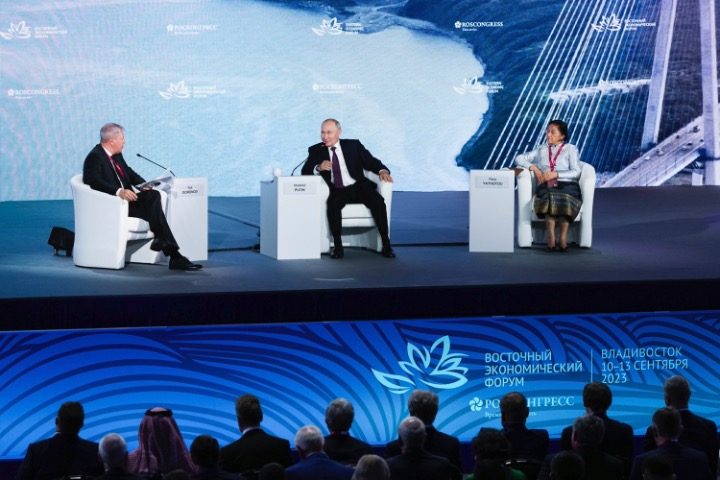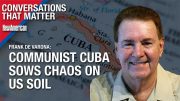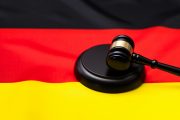
The 8th Eastern Economic Forum (EEF) in Vladivostok from September 10 to 13 saw Russian President Vladimir Putin meeting with and addressing international delegations from various countries such as India, China, Laos, Mongolia, and Myanmar, as well as media representatives from over 50 foreign countries, including “unfriendly” states. Here are some highlights of what happened during the three-day conference.
Criticism of the United States and Its Allies
Western countries are ruining the current system of international economic relations that they constructed in the first place, Putin declared in a speech at the plenary session of the EEF on September 12, noting that many countries object to such Western actions.
Putin added that the landscape of the international economy is altering partially because “some countries, primarily Western nations, are destroying the system of financial, trade, and economic relations with their own hands.”
He claimed that Western countries are undermining their own interests by misusing international financial structures for geopolitical reasons: “What, for example, are the restrictions on transactions in dollars leading to? All nations are mulling creating their own tools, new payment systems.”
The Russian president then posited that Western nations have reduced confidence in the global financial system by freezing Russia’s national reserves in retaliation for its actions in the Russo-Ukrainian conflict. “God knows, they have themselves to blame for the negative consequences they are already facing,” Putin contended.
Nonetheless, these damaging actions coincided with the increase of “real business cooperation,” encompassing countries around the world that withstand external pressure and prioritize national interests, the Russian leader remarked.
“They prioritize not temporary political events, but the promotion of their own projects … that bring direct and long-term benefits to their populations,” he said, elaborating that this would result in the formation of a new international model “shaped not by Western standards [and] catering to the selected ‘golden billion,’ but all of humanity … and the developing multipolar world.”
Trump Persecution Unearths “Rot” in United States
The state of the U.S. political system seems to be faltering, as evidenced by the various criminal charges embattling former President Donald Trump, Putin said. “The things happening to Trump are persecution of a political competitor,” he remarked.
Putin also said he believes U.S. elites are bent on keeping Russia as an adversary rather than a friend. Thus, Moscow would remain indifferent as to whether a Democrat or a Republican wins the 2024 presidential election.
Nevertheless, in light of current hostile U.S.-Russian ties, the political debacle regarding Trump will benefit Russia, Putin argued, as it exposes the “rot” within the U.S. political system and shows the world “who is opposing us.”
Ukrainian Losses in Ongoing Conflict
Regarding casualties the Ukrainian military has suffered since their counteroffensive started in June this year, Putin highlighted that the Kyiv regime did not attain the expected results it had hoped for.
“There are losses, big losses. Since the start of this counteroffensive, the casualties [have reached] 71,500 people.”
Moreover, the president contended, Kyiv is intent on getting results “at any cost,” making it seem as if the Ukrainian leadership under Volodymyr Zelensky would do so at the expense of Ukrainians’ lives.
Putin hinted that Kyiv is not motivated to adopt a peaceful resolution to the conflict, notwithstanding significant challenges during its counteroffensive.
“Sometimes it appears that [the Ukrainian leadership] does not consider the people they throw into their counteroffensive as their own,” Putin mused, claiming that Kyiv apparently plans to “chew off” as much territory as it can before contemplating a ceasefire.
The Russian leader then reported that over the past three months, Kyiv has lost 543 tanks and almost 18,000 armored vehicles of various types, and concluded that Ukraine has not been able to make any considerable conquests thus far.
Previously, Kremlin spokesman Dmitry Peskov accused the United States of “waging a war to the last Ukrainian, sparing no expense.” Peskov claimed that persistent arms support from Washington to Kyiv proved his point, while cautioning that American military aid would not alter the course of the conflict.
Based on the Russian Defense Ministry’s estimates presented this month, Kyiv had incurred “colossal” losses during its summer campaign, with over 66,000 troops killed and more than 7,600 heavy weapons damaged.
That being said, were Moscow to comply with Ukraine’s demands, Russia’s foes would likely leverage a ceasefire to rebuild their military arsenal for future conflicts, the Russian leader said, before alleging that Ukraine’s goal was to create a long-term reliance on foreign sponsors for its national security and economic aid.
Warmer Sino-Russian Ties Amid Western Attempts to Contain China
Putin asserted that while the West is seeking to jeopardize and contain China, such actions will eventually fail. “The lengths they go to [to] stall China’s development are shocking, but they cannot achieve it. This train is already gone.”
Moscow and Beijing enjoy resilient cooperative relations in various aspects, despite not establishing a military alliance or touting themselves as “friends against somebody.”
When questioned about the details of his private discussions with Chinese leader Xi Jinping during his visit to Russia in March, Putin joked that, as an erstwhile KGB officer, he does not “disclose secrets.”
Russian state-owned news agency TASS reported Putin’s declaration that Sino-Russian economic ties have become very sturdy, in spite of widespread sanctions from the West.
“Relations between Russia and China in the sphere of economic cooperation have reached a very high level,” Putin said. “Of course, this is all a derivative of what has been achieved in the political sphere. But nevertheless the results are more than good, they are excellent.”
Putin met with Chinese Vice Premier Zhang Guoqing on the fringes of the forum on September 12, and the Russian leader said that with the combined efforts of both Russia and China, bilateral ties have achieved a historic high, with seamless development in various fields such as trade and economy, according to reports from the Chinese state-controlled Xinhua News Agency.
The development of the Far East has become a new growth focus for Sino-Russian collaboration, Putin announced.
He also noted that Sino-Russian trade could reach $200 billion in 2023 for the first time, pointing out that bilateral trade had grown by around 30 percent annually in recent years.
Some Chinese observers have opined that by enhancing economic cooperation with major developing countries, Moscow is attempting to show that Russia can develop without Western involvement.
China, for its part, has declared “no limits” to its relations with Russia, with Chinese economic aid arguably mitigating the ramifications of Russia’s exclusion from the global financial system.
At the forum, Zhang said that China was happy to cooperate with Russia to share development opportunities, boost mutually beneficial cooperation, and bolster strategic coordination on regional development.
Chinese imports of Russian agricultural products such as soybeans and rapeseed oil have dramatically soared as Beijing ramps up efforts to ensure food supplies, as China has made food security a priority for its population of around 1.4 billion.
Both countries signed multiple fresh agreements on September 11 to facilitate the transport of Russian grain to China as rapidly and efficiently as possible.
Consequently, the New Land Grain Corridor — a group of firms overseeing the development of grain production and infrastructure in Russia’s Ural Mountains, Siberia, and the Far East — will cooperate with the state-backed China Chengtong International Investment to set a logistics hub at the border.
North Korea’s Kim’s Meeting With Putin
North Korea’s leader Kim Jong Un has proclaimed that his visit to Russia was a clear sign of the “strategic importance” of bilateral ties, state media KCNA reported on September 13.
Kim arrived in Russia by private train on September 12 for discussions with Putin, despite threats from Washington that both countries should not engage in arms trade. “Kim Jong Un said that his visit to the Russian Federation … is a clear manifestation of the stand of the WPK and the government of the DPRK prioritizing the strategic importance of DPRK-Russia relations,” the KCNA report said.
The DPRK refers to North Korea’s official name, the Democratic People’s Republic of Korea, whereas the WPK is the Workers’ Party of Korea, the only ruling party in the pariah state.
Images published by KCNA depicted Kim arriving at the train station in the border town of Khasan on September 12 and being welcomed by senior officials from Moscow and elsewhere. Furthermore, Kim was photographed meeting with Russia’s Natural Resources Minister Alexander Kozlov.
Kim’s whereabouts have since become uncertain, although Japan’s Kyodo news agency and South Korean media have reported that he might meet Putin at the Vostochny cosmodrome, a spaceport in eastern Russia.
Reporters given access to Putin at the forum did not question the Russian leader about details of Kim’s visit, but Putin told journalists he would head to the Vostochny cosmodrome. “I’ve got my programme there, and when I get there you’ll know,” he was cited by Russian news agencies as saying.
This trip signifies Kim’s first visit to Russia in almost four years, and his first foreign visit after the Covid-19 outbreak, KCNA reported.
Kim’s visit aims to propel North Korea-Russia ties to a “fresh higher level,” KCNA said. A Putin-Kim summit “is likely to heavily focus on Russia and North Korea’s possible military cooperation,” Yang Moo-jin, president of the University of North Korean Studies in Seoul, told AFP.
The Kremlin’s Peskov said Putin and Kim would “cooperate on sensitive areas that should not be the subject of public disclosure and announcements.”
Analysts have speculated that Moscow would probably request artillery shells and antitank missiles from North Korea, which desires advanced satellite and nuclear-powered submarine technology in exchange.
Siemon Wezeman, a senior researcher at the Stockholm International Peace Research Institute, remarked that it was “entirely possible” North Korea had large stocks of ammunition that Russia could tap into, although both Moscow and Pyongyang have dismissed claims that North Korea has provided or will provide weapons to Russia.
The White House cautioned that North Korea would “pay a price” if it supplied Russia with arms for the conflict in Ukraine.
“I would remind both countries that any transfer of arms from North Korea to Russia would be in violation of multiple United Nations Security Council resolutions,” U.S. State Department spokesman Matthew Miller said on September 11. “We, of course, have aggressively enforced our sanctions against entities that fund Russia’s war effort, and we will continue to enforce those sanctions and will not hesitate to impose new sanctions if appropriate.”
The Far East’s Significance in Russia’s Economic Future
The contributions of the Far East to Russia’s economic future and Russia’s status in a multipolar world is of utmost significance, Putin declared, stating that Russia’s top priority for the 21st century was the region’s development.
He noted that the Far Eastern Federal District comprises 40 percent of Russia’s landmass. Recent years have seen the Russian government unveiling several programs to rejuvenate the region and bolster its economy, with Western embargoes expediting that process.
Investments in the regional economy are growing three times faster than the national average, Putin claimed. “The growth of investment in fixed capital from 2014 to 2022 was 13% throughout the country, while in the Far East it was 39%,” he stated before elaborating that production volumes have mirrored those statistics, with the rate of industrial growth in the Far East surpassing the national average.
“Over 10 years, the cargo turnover of the Far Eastern seaports increased by 1.6 times, housing commissioning by 1.3 times, electricity consumption by 1.2 times. Annual gold production in the east of the country increased by 1.6 times, coal by 2.8 times,” the president declared, emphasizing that it was not just about percentages, but that “everything is growing exponentially.”
“There are development plans, they were drawn up earlier, so it will be even easier for us to implement them. There are funds, investors are ready to invest,” Putin said.
According to the EEF website, the agenda of the forum this year is focused on “The Path to Partnership, Peace, and Prosperity,” showcasing Russian plans to set up relations with all interested foreign partners.
“Our country is fully open to an inclusive dialogue on pressing regional problems and has every intention of continuing to participate actively in efforts to nurture relations between the states of the Asia-Pacific region and contribute to a system based on equality, mutual benefit, and respect for the legitimate interests of all,” Putin said during a speech to forum participants.
“It is important that we identify ways to create new, highly efficient production and logistics chains, modernize transport and energy systems, and ensure food and environmental security in the region,” he maintained.
The EEF was set up as a platform for business discussions about the latest development issues in the Russian Far East.



